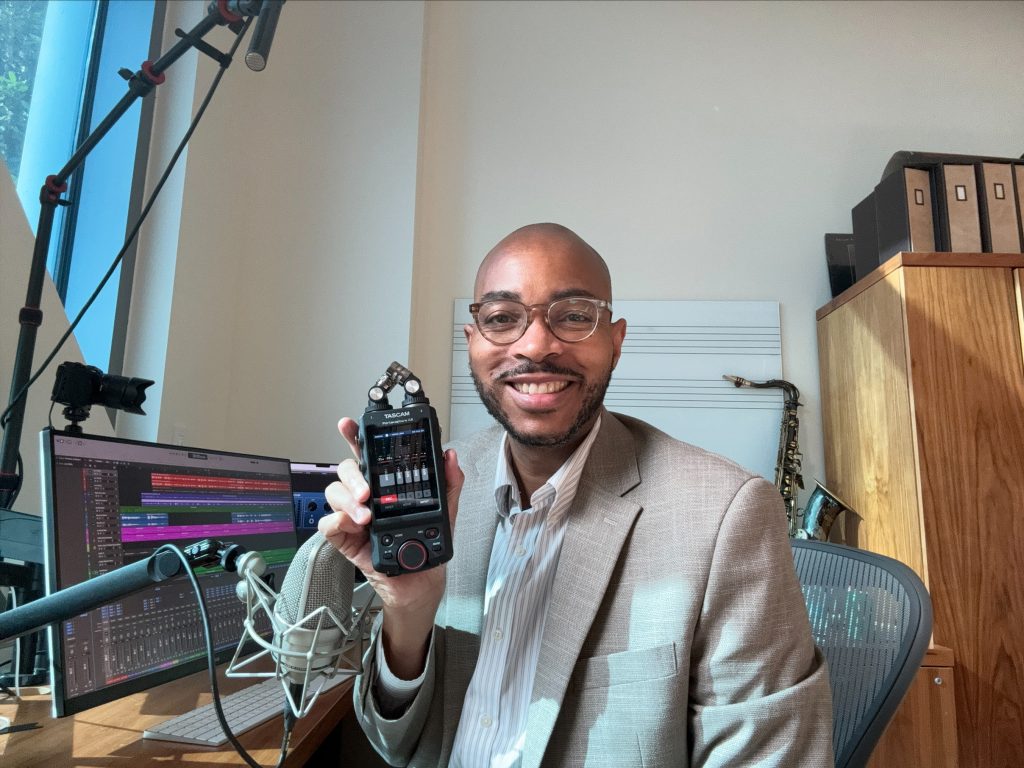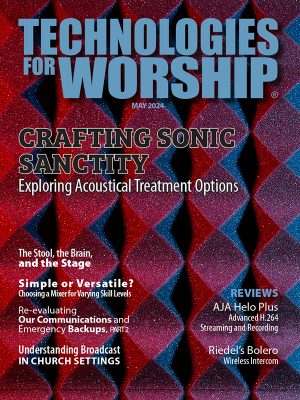
For Melvin L. Butler, PhD, Associate Professor of Musicology at the Frost School of Music, University of Miami, Coral Gables, FL, the ability to easily capture rehearsals, performances, location sound, and individual practice sessions is of paramount importance. With a busy schedule that encompasses a wide range of musical endeavors, having a compact, easy-to-use, versatile recorder is crucial to his activities. This is precisely why he relies on his Portacapture X8 8-channel 32-bit float Portable Audio Field Recorder from TASCAM.
As a saxophonist and ethnomusicologist at the University of Miami, Dr. Butler has an impressive track record. He the author of Island Gospel: Pentecostal Music and Identity in Jamaica and the United States (University of Illinois Press, 2019) as well as numerous articles on music, religious experience, and cultural identity in the Caribbean and North America. As a performer, he has worked with Betty Carter, Joey DeFrancesco, Christian McBride, Jimmy McGriff, Joni Mitchell, and others. Further, he is featured with Brian Blade and the Fellowship Band on several albums, including the Grammy-nominated Landmarks (2014), Body and Shadow (2017), and Kings Highway (2023), and he is a featured soloist on the 2018 Grammy-winning recording American Dreamers: Voices of Hope, Music of Freedom by the John Daversa Big Band. Dr. Butler discussed his fondness for the TASCAM Portacapture X8.
“I most often use the Portacapture X8 to record rehearsals and performances when I’m touring with various groups,” he explained. “With the Fellowship Band, for example, it helps me to document song sections and chord changes that I need to remember, and it allows me to keep a record of past performances, solo orders, and song forms—particularly if there is an extended period of time between concerts.”
“The Portacapture X8 is also quite helpful as a compositional tool,” Dr, Butler added. “I’ll turn it on while I work out ideas on my saxophone or at the piano, and then later consult the recording to extract musical building blocks I can rework or assemble into a finished piece of music. As a researcher, I also use the device for ethnographic field recordings of church services and gospel music performances, along with one-on-one interviews. A solid field recorder is a vital piece of equipment for ethnomusicologists, and the Portacapture X8 enables me to capture field recordings at much higher quality than what I’d get from my phone.”
In addition to these activities, Dr. Butler also uses his Portacapture X8 in the creation of podcasts. “As a professor, I’m starting to create content podcasts for my students at the University of Miami. My African American Song Traditions course employs a discussion-based pedagogy known as ‘flipped learning,’ in which students’ first exposure to content takes place before class. I can record my lectures ahead of time for students to access, and we can then use class time to discuss the material.”
When queried about those Portacapture X8 attributes that he finds most appealing, Dr. Butler offered the following thoughts. “The 32-bit float capability is a terrific feature,” he said. “It has greatly reduced the stress of recording Fellowship Band performances and rehearsals. We play with an extraordinary amount of dynamic shading and variability, and the X8 enables me to record without having to worry about distortion. I also appreciate the pre-record feature, which has saved me from losing the first few seconds of a song—particularly since invaluable musical moments often occur quickly or without advance notice.”
The optional TASCAM AK-BT1 Bluetooth adapter enables one to control the Portacapture X8 via the Portacapture Control mobile app and Dr. Butler finds this feature extremely useful. “I really enjoy the AK-BT1 Bluetooth adapter,” he reports. “Whether I’m using the device for ethnomusicological fieldwork or for a performance, it’s incredibly useful to be able to control the X8 from my iPhone. It means I can start and stop without having to bend over to touch the device or worry about handling noise. In addition, this feature makes recording a lot less intrusive since I can capture the sounds I need without distracting my interviewees or calling unwanted attention to the recording process. I love that the easy-to-read user interface on my phone mirrors the beautiful color display of the unit itself.”
While the Portacapture X8 has various presets to make the recoding process quick and easy, Dr. Butler prefers the exceptional control offered by the recorder’s Manual Mode. “Manual mode gives me everything I need,” he explained. “It provides maximum flexibility but is still simple enough to understand without having to be an audio expert. I may explore podcast mode in the upcoming months because of the ability to upload preloaded sounds and inject them into a recording on the fly.”
Dr. Butler acquired his Portacapture X8 in March of 2023 and since that time, he has become very fond of the unit, “I’m delighted with my purchase of the Portacapture X8. I wear many hats in my career, including performer, professor, and ethnographic fieldworker—and this device serves as a vital tool in all my professional activities. In the Fellowship Band, sometimes two or three of us will record a performance or rehearsal simultaneously from different parts of the stage. Afterwards, we can compare what we’ve captured and/or mix the tracks to find the most sonically desirable recording. That’s hard to beat!”
To learn more about Melvin L. Butler, PhD, visit his LinkedIn profile at https://www.linkedin.com/in/melvinbutler/.




